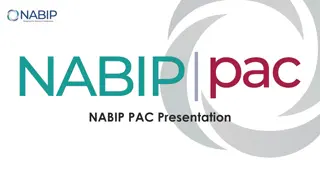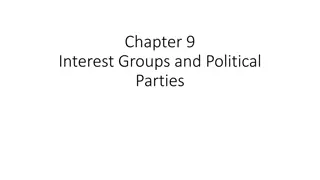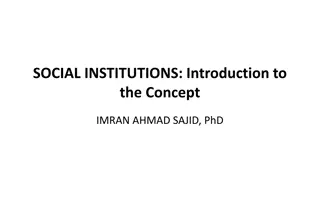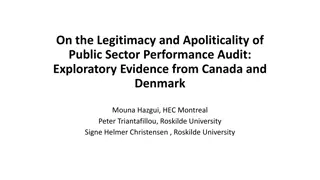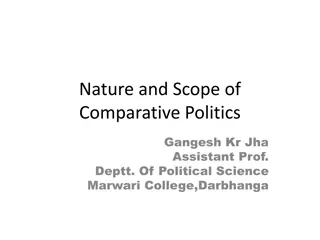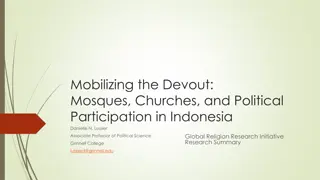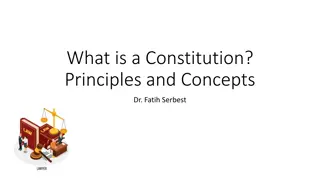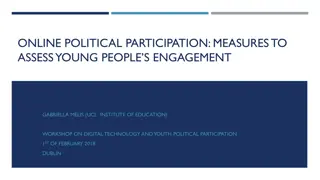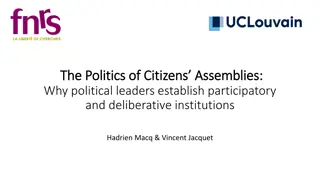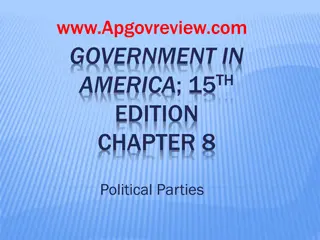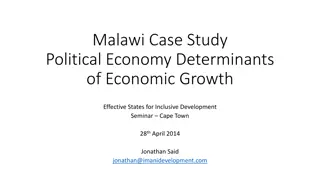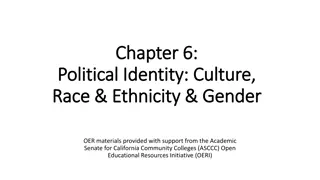Understanding NABIP PAC: Political Action Committee Overview
Federal law prohibits direct financial contributions to federal candidates, hence organizations like NABIP establish Political Action Committees (PAC) to advocate for political priorities. Learn about NABIP PAC, its accounts, eligibility criteria, contribution rules, and how funds are utilized. Disc
1 views • 14 slides
Overview of AANAPISI Program in the United States
The Asian American and Native American Pacific Islander Serving Institutions (AANAPISI) Program aims to support institutions with a minimum of 10% Asian American and Native American Pacific Islander undergraduate enrollment. Currently, there are 54 funded AANAPISI institutions across 16 states and t
0 views • 13 slides
Understanding Active Citizenship & Civic Engagement: Definitions and Importance
Encouraging citizens and organizations to actively participate in civil society and decision-making processes is vital for a democratic society. Active citizenship involves participation in public affairs, civil society, and political life with a focus on human rights, democracy, and community well-
1 views • 22 slides
Understanding Interest Groups and Political Parties in American Politics
Interest groups play a significant role in American politics, aiming to influence government decisions through lobbyists and various strategies. They represent different interests such as economic, public, and intergovernmental. Lobbyists engage with federal branches and judicial institutions, utili
0 views • 7 slides
Interdisciplinary Approach in Political Science and Its Relation with History
The need for an interdisciplinary approach in political science emerged in the 20th century to study political issues from various social science perspectives. This approach emphasizes the interrelation between political science and other disciplines like history. History provides the foundation for
0 views • 23 slides
Institutionalism and Methodological Issues in Political Science
Institutionalism is a foundational concept in political science, emphasizing the study of governing institutions and their role in shaping political behavior. It explores inductive and deductive approaches to research, highlighting the significance of empirical evidence and theoretical assumptions.
0 views • 19 slides
Understanding Gramsci's Political Theory and its Relevance Today
Gramsci's political theory, focusing on concepts such as hegemony, historical bloc, and the role of intellectuals, offers valuable insights into contemporary political challenges. Explored through the lenses of Prof. Ken Spours and Stuart Hall's analytical tradition, this analysis sheds light on Con
0 views • 13 slides
Evolution of Citizenship in Liberal Democracy
Citizenship within liberal democracy entails equal rights, duties, liberties, and constraints for individuals within a political community. The entrenchment of civil and political rights has shaped the struggle for membership and participation in political communities. Civil rights, essential for in
1 views • 11 slides
Understanding Social Institutions: An Introduction by Imran Ahmad Sajid, PhD
Discover the concept of social institutions through Dr. Imran Ahmad Sajid's explanation. Explore how institutions are established practices that shape complex social forms, distinguishing between institutions and conventions, and their relation to society and culture. Delve into the role of institut
0 views • 14 slides
Role of Institutions in Economic Development: A Comprehensive Analysis
Understanding the significance of institutions in economic development is crucial, as they play a pivotal role in shaping societal, political, and economic relations. Institutions, defined as established customs or practices, act as the rules of the game that structure human interactions. Their qual
0 views • 13 slides
Artha Rin Ain 2003: Special Legislation for Financial Institutions' Debt Recovery
Artha Rin Ain 2003 is a special legislation aimed at enhancing the recovery process of outstanding debts of financial institutions in Bangladesh. The law addresses the shortcomings of previous acts and establishes dedicated courts for the swift resolution of cases involving unpaid claims. It encompa
0 views • 15 slides
Understanding Political Theory through a Contextual Approach
Exploring G.H. Sabine's perspective on political theory through a contextual approach, emphasizing the importance of historical context and societal influences. Sabine argues that while political theory evolves with its contemporary politics, it should be analyzed within its specific time and social
0 views • 9 slides
Understanding Public Sector Performance Audit in Canada and Denmark
The study explores the legitimacy and apoliticality of Performance Auditing (PA) in Canada and Denmark, focusing on how Supreme Audit Institutions (SAIs) maintain political neutrality and legitimacy. Existing knowledge points to the inherent political nature of PA and the challenges SAIs face in pre
4 views • 9 slides
Understanding the Nature and Scope of Comparative Politics
Comparative politics explores a wide range of political activities, going beyond national governments to include various institutions and organizations. It involves analyzing different forms of governments and institutions to identify similarities and differences in political behavior. The disciplin
0 views • 14 slides
Evolution of Political Institutions from Polybius to the Federalist Papers
Explore the evolution of political institutions from ancient thinkers like Aristotle and Polybius to the insights reflected in the Federalist Papers. Delve into the classification of government types, the analysis of political constitutions, and the cyclical nature of states and revolutions as discu
0 views • 26 slides
Understanding Political Beliefs and Behaviors: A Comprehensive Overview
Explore the formation, evolution, and transmission of political beliefs, as well as the impact of differing beliefs and behaviors on the political process. Delve into platform issues, political affiliations, and their influences to gain a deeper understanding of the political landscape.
1 views • 53 slides
Understanding Nationalism in Political Science
Nationalism, a complex concept, defines the nation as the fundamental unit of political rule. It encompasses a mix of objective and subjective factors, including cultural, ethnic, and political traits. The definition of a nation is subjective, based on how its members perceive themselves as a distin
0 views • 27 slides
Mobilizing the Devout: Examining Political Participation in Indonesian Worship Communities
This book project explores how mosques and Christian houses of worship in Indonesia serve as spaces for political interaction and civic skill development. Through participant observation and surveys, the project reveals that both religious institutions play a role in shaping worshippers' political e
1 views • 36 slides
Understanding Political Science: A Comprehensive Overview
The study of political science delves into various aspects, from the pursuit of the good society to the exercise of power and the allocation of resources. It encompasses specialized fields such as American politics, international relations, comparative politics, public policy, and political philosop
0 views • 5 slides
Understanding Social Institutions and Welfare in Human Society
Social institutions play a crucial role in addressing social problems and meeting the basic needs of human societies. Concepts of welfare and institutions like family, education, economy, and politics are explored. Welfare is described as traveling smoothly on the road of life, derived from the root
0 views • 21 slides
Understanding Constitutions: Principles and Concepts
Contemporary constitutions outline the fundamental principles of the state, governmental structures, and citizens' rights in a higher law. Constitutions serve various functions such as defining political boundaries, expressing national identity, establishing rights and duties, regulating political i
0 views • 24 slides
Understanding Banking Institutions and Their Types
Banking institutions play a vital role in the financial sector by mobilizing public savings and providing funds to meet various financial needs. Commercial banks, investment banks, co-operative banks, and central banks are some examples of banking institutions. Scheduled banks enjoy certain benefits
0 views • 17 slides
Political Development Theory and Practice: An Overview
Political development refers to the evolution of institutions forming the political power system of a society. Initially popular in the 60s-70s to describe political change, it later fell out of favor for being Euro-centric but has since regained significance. The concept encompasses aspects like po
0 views • 13 slides
Measures to Assess Young People's Online Political Participation
Workshop highlights measures for evaluating young people's engagement in online political activities, including definitions, typologies, and forms of engagement. The study discusses differences within age groups, prevalence of online political expression, and the use of social media for political in
0 views • 8 slides
The Politics of Citizens Assemblies: Why Political Leaders Establish Participatory Institutions
This study delves into the motivations behind political leaders establishing citizens assemblies, focusing on the German-speaking Community as a case study. Through interviews and analysis, it explores how these institutions lead to better decisions, heal democracy, and strengthen community bonds, u
0 views • 10 slides
Political Party Funding Act 2018 Overview
The Political Party Funding Act of 2018 in South Africa aims to enhance multi-party democracy by regulating the funding and donations to political parties. It establishes the Multi-Party Democracy Fund funded by private sources, alongside the existing Represented Political Party Fund. The Act prohib
0 views • 17 slides
Understanding Political Party Funding Act of 2018
The Political Party Funding Act of 2018 regulates the funding of political parties in South Africa, ensuring equitable and proportional funding for parties participating in national and provincial legislatures. The Act defines various terms such as donations, foreign persons, and political parties,
0 views • 42 slides
Evolution of Political Ideas and Influences on American Founding
In the history of politics, major ideas like laws of nature, unalienable rights, divine right of kings, social contract theory, and rights of resistance have influenced the American founding. Various traditions such as Judeo-Christian, English common law, Enlightenment, and republicanism played a si
0 views • 68 slides
Understanding Political Parties in America
Political parties in America play a crucial role in the electoral process, serving as linkage institutions between the public and government. They consist of party members in the electorate, organizational structures, and elected officials in government. The chapter delves into the meaning of politi
0 views • 12 slides
Political Economy Determinants of Economic Growth: Malawi Case Study
Presenting findings from a seminar in Cape Town, this case study delves into Malawi's political dynamics impacting economic growth, historical evolution, growth acceleration, maintenance, and structural transformation. Analyzing the roles of institutions, political elites, and business in shaping gr
0 views • 35 slides
Explore the Fascinating World of Political Science
The Department of Political Science offers a range of courses, delving into topics such as political theory, international relations, and governance. Understand the distinction between politicians and political scientists, and explore branches of political science like public administration and huma
0 views • 16 slides
Understanding Political Identity: Culture, Race & Gender in Society
Explore the intricate aspects of political identity, culture, race, ethnicity, and gender in society. Discover how individuals shape their identities and the impact of political mobilization on society. Uncover the significance of political socialization and the role of societal institutions in shap
0 views • 20 slides
Evolution of Political Protests in Modern Russia: A Historical Overview
This article provides an in-depth analysis of the evolution of political protests in modern Russia from 1990 to present. It discusses the attitude of Russian journalists towards protests, basic concepts of political protest in modern political science, myths surrounding protests in Russia, and the f
0 views • 24 slides
NORDRESS Project Governance and Administration Overview
The NORDRESS project involves various entities like the Executive Board, Council, Partner Institutions, and Supporting Institutions for day-to-day management, decision-making, and overall support. The Project Manager from the University of Iceland plays a central role, coordinating activities and li
0 views • 13 slides
Impact of Political Stability on Equity Trading Costs of Cross-Listed Firms
The research explores the relationship between political stability and equity trading costs of cross-listed firms, highlighting the impact of political institutions, liquidity, and investor protection. It delves into the importance of factors like quality of political institutions, transparency, and
0 views • 24 slides
Interdisciplinary Relationships in Political Science
Political science and history share a symbiotic relationship, with history providing the foundation for political analysis while political science influences historical events. The contribution of economics to political science is evident in how economic conditions shape political ideologies and pol
0 views • 12 slides
Understanding Political Theory: Definitions, Differences, and Significance
Political theory encompasses systematic explanations of political phenomena, distinct from political thought which involves ideas and opinions of philosophers. It constitutes both political science and philosophy, addressing both empirical and evaluative aspects. The significance lies in finding sol
0 views • 7 slides
Remedial Measures Implemented by Indian Political Party
Explore the impactful remedial measures taken by a prominent political party in India through a collage presentation. Delve into the functions of political parties, understanding partisanship, the necessity of political parties, and more. Gain insights into the significance and role of political par
0 views • 23 slides
Understanding Political Institutions and Their Significance in Governance
Dr. R.E.V. Gyampo, a lecturer in the Department of Political Science at UG College of Education, explains the concept of institutions, distinguishing between formal and informal ones. He emphasizes the importance of rules within institutions for predictability and behavior governance. The discussion
0 views • 14 slides
Understanding Corruption and Its Implications on Institutions and Society
Corruption, as discussed by Jonathan Hopkin from the London School of Economics, is viewed through various lenses - from a reflection of traditional hierarchical ties in modernization theory to the inadequacy of political institutions. Economists highlight how corruption distorts market allocation.
0 views • 8 slides
